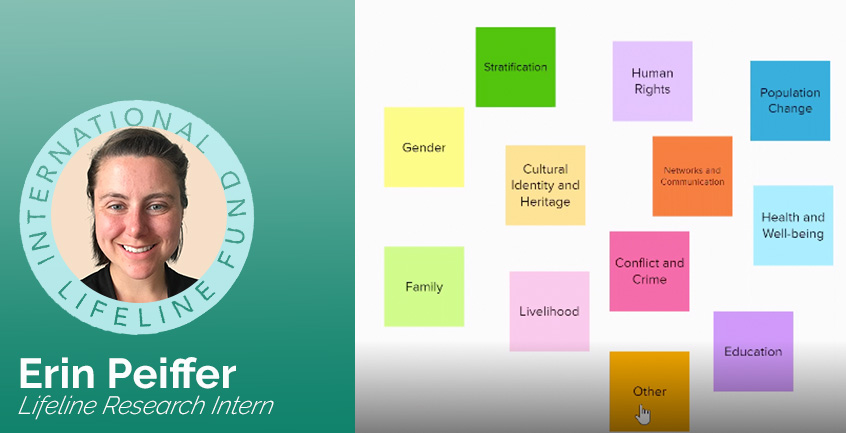By Erin Peiffer
Since September of 2020, I have been working with Lifeline as a research intern. In this role, one of my major responsibilities has been planning a field study on the adoption and social impact of improved cookstoves in rural and peri-urban Uganda. Due to COVID-19, my work preparing for the study had to be carried out remotely with Lifeline staff in Uganda instead of in person. Recently, we finished data collection for the study. Reflecting on my recent experiences, here are five lessons I learned that may be useful to others remotely planning field studies.
1.) You cannot have enough communication.
In preparing for the field study, the Lifeline team and I communicated frequently through a variety of media. Virtual meetings were most helpful in aligning our understanding on the logistical aspects of the study whereas emails were great for summarizing these discussions, bookmarking important documents, and outlining next steps. After several initial meetings to determine appropriate study locations, I developed a series of training videos breaking down the field study into each component (overall field study, card sorting, and ethnographic decision trees).
Once the field study started, WhatsApp became our primary means of communicating quick updates and questions, with follow-up calls to discuss topics in more depth. Using a variety of forms of communication was helpful at each stage in the planning and implementation process to ensure the team was on the same page. On reflection, I think it would have been beneficial for us to have daily debriefing calls while data was being collected to touch base and make sure any necessary adjustments were implemented in a timely manner.
2.) Your study is only as good as your field partners.
Planning out your research questions and methodologies is only a small fraction of the work required to prepare and carry out a field study. For the rest – budgeting, logistics, understanding the local context (community engagement strategies, politics, security, etc.), and much more – I was completely reliant on Lifeline staff; namely, Rebecca Apicha and Doreen Asio Faso from the Environment team). Their input, collaboration, and dedication to this project was absolutely crucial to accomplishing our goals. Without their insight and support, I could have never pulled off the study.
3.) Test your instruments first.
Our field study was carried out in two phases. The first included open-ended, semi-structured interviews and a card sorting activity on social impacts. The second phase involved asking close-ended survey questions. In the first phase, I worked collaboratively with Lifeline staff on developing the interview protocol and then data collection began. I learned quickly that we should have tested the instruments on a few participants before launching into full data collection.
Feedback I received from field staff after that first day was extremely insightful. I learned that most participants in Lira did not want to be audio recorded during the card sorting activity. If we had known this was going to be a large obstacle, we could have adjusted our protocol and tools to collect the same data through different means. Additionally, participants were reluctant to say that certain social impacts were not impacted or negatively impacted. Similarly, had we tested our instruments on a small group first, we could have updated the protocol accordingly and ensured that all of the data collected met our initial goals.
Learning from this experience, in the second phase of data collection we tested out our survey prior to starting data collection. This was helpful in improving the survey for clarity and ease of implementation. I learned that having multiple choice options on the survey was much easier and faster compared to manually entering data. Since the survey included close-ended questions (with a limited set of options to select), making sure the survey sufficiently captured the appropriate range of responses was very important. We still had to make some adjustments throughout the remainder of data collection, but I think we avoided some major pitfalls by testing the survey first.
4.) Be ready to adjust your plans.
In a perfect world, the study you plan is the study you execute. In reality, this is rare, especially when trying to plan a study remotely from a different country. Our timeline was the most impacted. First, we couldn’t start data collection until our study was approved by Oregon State University’s Institutional Review Board (IRB) which occurred several weeks after my initial time estimate.
Once we received IRB approval, we then had to shift our field study start date again. Originally, we had planned to start data collection the same week as Uganda’s national elections. Members of the Lifeline team recommended moving the field study start date by two weeks; first, to ensure that participants did not perceive the field study to be linked to the elections and, second, to account for any security considerations that might arise as a result of the election.
Other safety concerns about recent violence in Karamoja were brought to our attention right before we were planning to start data collection for the second phase of the study, leading us to consider postponing data collection again or even changing the study locations. In the end, we decided to proceed as planned, but made sure to end data collection earlier in the day so field staff could make it home before dark when violence is more likely, and to only collect data in well trafficked areas.
Lastly, we had to revisit the budget and timeline again near the very end of the project when I had to increase the sample sizes due to a miscalculation early in the planning of the study. Thankfully, everything worked out because we had the flexibility to adjust as needed throughout the process. If our timeline had been less forgiving, or our budget absolute, we may have run into problems.
5.) Stay calm, and trust in your team.
Planning a field study can be stressful, especially when you can’t be there in person to provide hands-on assistance. During our field study, I learned to trust the expertise of Lifeline’s field staff in carrying out the study successfully. I feel so grateful for the opportunity to work and grow with Lifeline during this field study, and I hope that my lessons learned throughout this process help others in remotely planning field studies in the future.
—

Erin is Lifeline’s Research Intern. Learn more about her and her work here.
